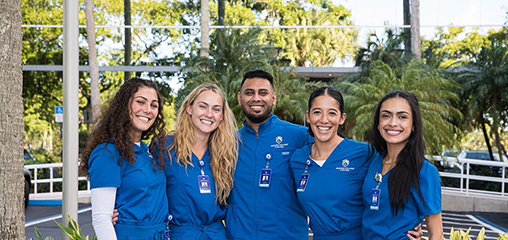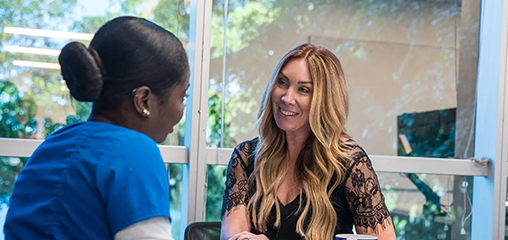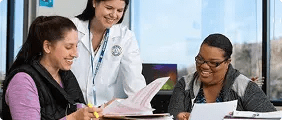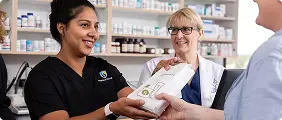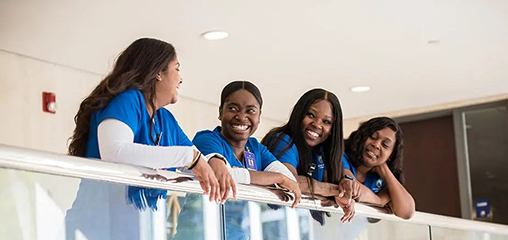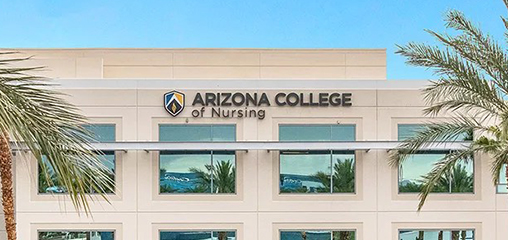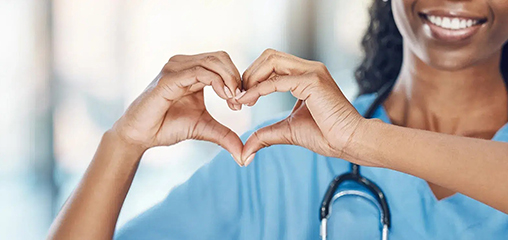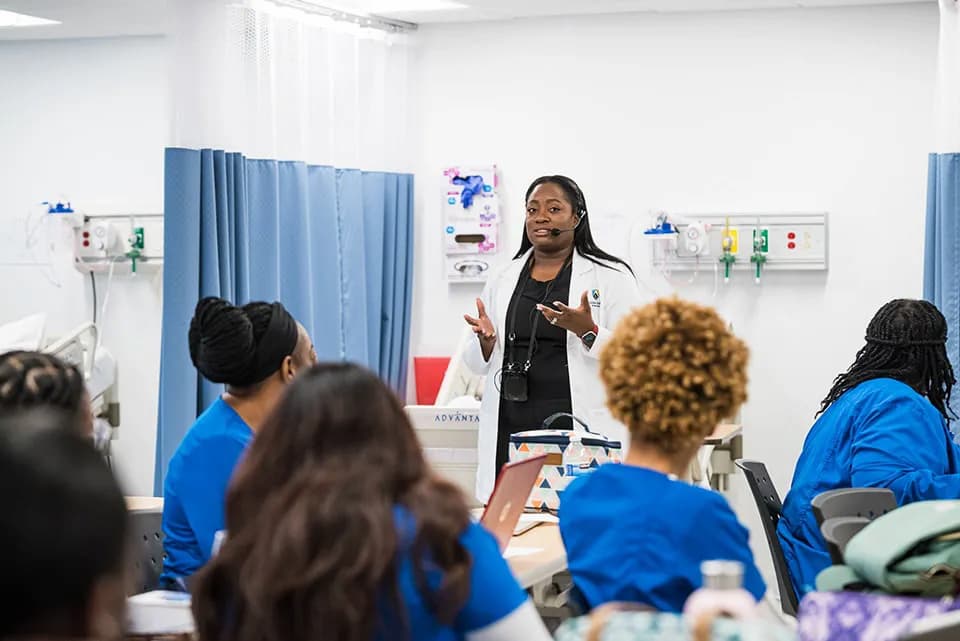
BSN Program
Nursing Curriculum
Learn more about our CCNE Accredited Program.
Classes begin March 2nd
Nursing Curriculum Overview: 9 Semesters to a BSN
Our BSN program is structured across nine semesters, combining general education with core nursing coursework as part of a comprehensive nursing degree. Within the nursing portion of the curriculum, students complete clinical practicum hours that offer hands-on experience in both direct and indirect patient care. These placements give you experience with different types of patients and care environments, helping you feel confident and prepared for many areas of nursing practice.
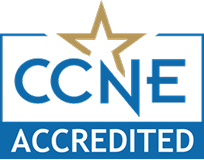
The Bachelor of Science in Nursing (BSN) degree program at Arizona College of Nursing is accredited by the Commission on Collegiate Nursing Education (www.aacnnursing.org).
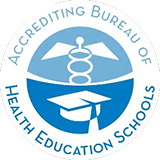
All Arizona College campuses are institutionally accredited by the Accrediting Bureau of Health Education Schools (ABHES), a U.S. Department of Education-recognized accrediting agency.
Clinical Rotations & Lab Experiences
At AZCN, you’ll gain valuable experience through a mix of clinical rotations and on-campus lab sessions. Clinical placements span hospitals, clinics, and community settings, helping you develop skills in a variety of real-world environments. In the lab, you’ll practice essential techniques that prepare you for safe, effective patient care.
Simulation-Based Curriculum
Simulation at AZCN brings learning to life with realistic, hands-on scenarios that reinforce classroom knowledge. Whether in person or virtual, these experiences help strengthen your clinical judgment and prepare you to confidently navigate complex patient situations.
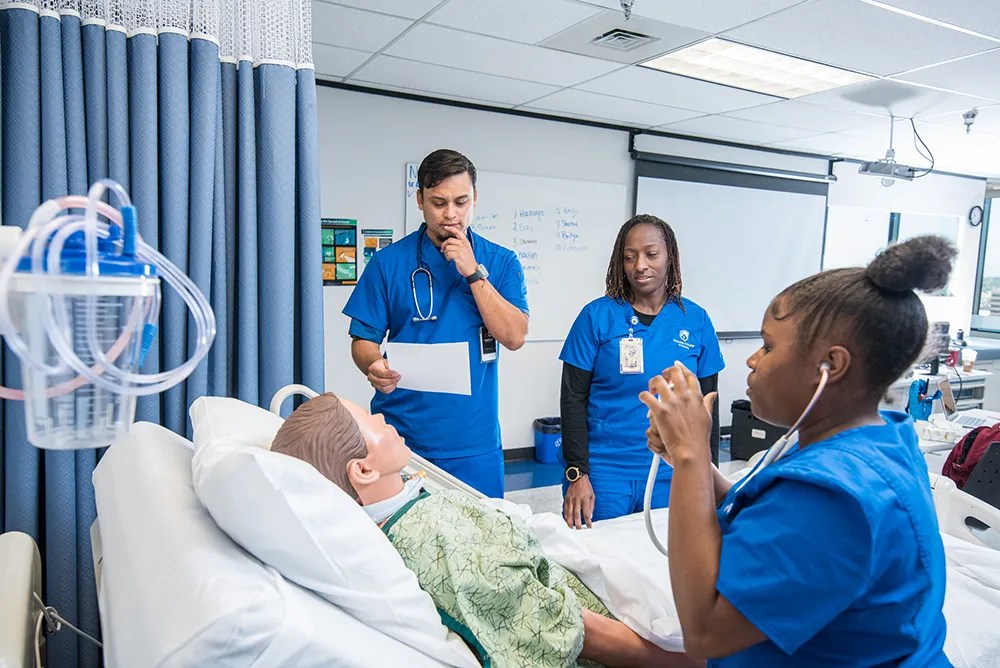
Curriculum & Clinical Nursing Course FAQs
Our curriculum is designed to build progressively, starting with foundational nursing concepts and skills before advancing into more complex clinical and simulation experiences. Students move through a combination of classroom instruction, lab practice, simulation, and clinical rotations. Each component is carefully sequenced to support your learning and readiness for real-world patient care. NCLEX preparation is built into the curriculum to help ensure you’re fully equipped for exam success.
Faculty are highly involved and accessible, offering support through office hours, one-on-one coaching, and skills remediation when needed. There are also structured review sessions, tutoring resources, and mentorship opportunities. You won’t be on your own—support is built into our nursing degree program to help you succeed.
Clinical placements are assigned by the program to ensure students meet all learning objectives and state requirements. The sites are selected to provide a balance of experiences across different patient populations and care settings.
Nursing prerequisites are foundational courses that prepare you for your nursing program coursework. These typically include science courses, psychology, and general education requirements. Your nursing prerequisites provide you with the essential knowledge base you’ll need to understand and succeed in your nursing courses once you begin the clinical portion of your education.
You may be able to transfer equivalent credits to fulfill some of your nursing prerequisites, though not all credits are guaranteed to transfer. Our admissions team evaluates transfer credits on a case-by-case basis to determine which courses meet our nursing prerequisites standards. If your previous coursework doesn’t transfer for nursing prerequisites, you can complete these courses during your first year as part of your BSN program. We encourage you to contact our admissions office to discuss your specific situation and learn more about your transfer options for nursing prerequisites.
No, AZCN does not require prerequisite courses for admission. You can apply and enroll in our BSN program without completing prerequisites beforehand. Your nursing prerequisites are built into the program and completed during your first year. If you have previous college coursework, you may be able to transfer approved credits to fulfill these prerequisites. Our transfer of credit team evaluates transfer credits on a case-by-case basis. Contact our admissions office to discuss your specific situation and learn about your transfer options.
In-Person Simulation
Our in-person simulation sessions provide a realistic setting where you can apply skills, work through patient cases, and receive guidance from experienced faculty. You’ll engage with advanced simulation tools and role-based scenarios that closely mirror clinical environments.
Virtual Simulation
Virtual simulation offers a live, faculty-led experience where you’ll move through patient scenarios, check-ins, and debriefings in real time. These sessions support critical thinking and clinical reasoning from wherever you are, helping bridge the gap between theory and practice. Virtual simulation is currently leveraged as an option for clinical replacement only when needed.
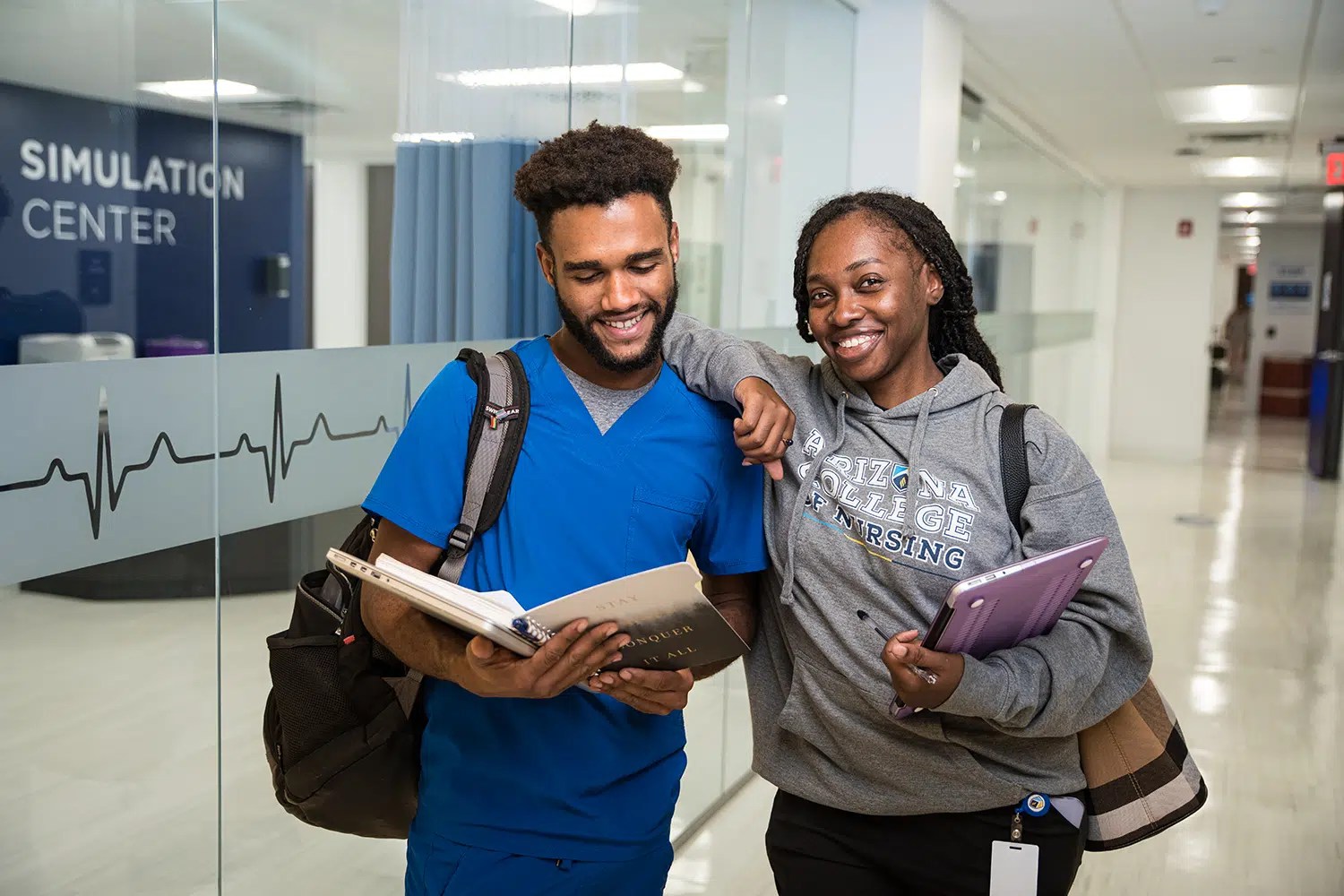
BSN Program & Simulation Nursing Course FAQs
Our program includes 630 clinical hours in a variety of inpatient and outpatient settings, giving you experience across different areas of patient care. You’ll also complete 270 lab hours focused on building and reinforcing practical nursing skills in a hands-on, on-campus environment.
You’ll complete a total of 50 hours of in-person simulation. Virtual simulation is used as a supplemental option for clinical replacement. These experiences help you build clinical judgment and communication skills in a realistic, supportive setting. Plus, you’ll participate in 12 additional hours of hands-on skills practice and review to sharpen core techniques before entering clinical environments.
On-campus time varies by term, but typically includes lab or simulation sessions, clinical preparation, and in-person classes. Expect to be on campus multiple days per week, especially during the more skills-intensive portions of the program. Clinical hours may also require travel to local healthcare sites.
Yes, the curriculum is built to align with NCLEX testing standards and competencies for pursuing a nursing career. Throughout our program, you’ll develop the critical thinking and clinical skills needed to succeed on the exam and earn your nursing license. Simulation, lab practice, and clinical hours are all integrated to support your exam readiness and transition into practice.
24 Nursing School Campus Locations
With 24 campus locations across the US, you can earn your Bachelor of Science in Nursing (BSN) close to home and complete your degree in as little as three years.
Ready to learn more or find the campus that’s right for you? Click below to explore your options.
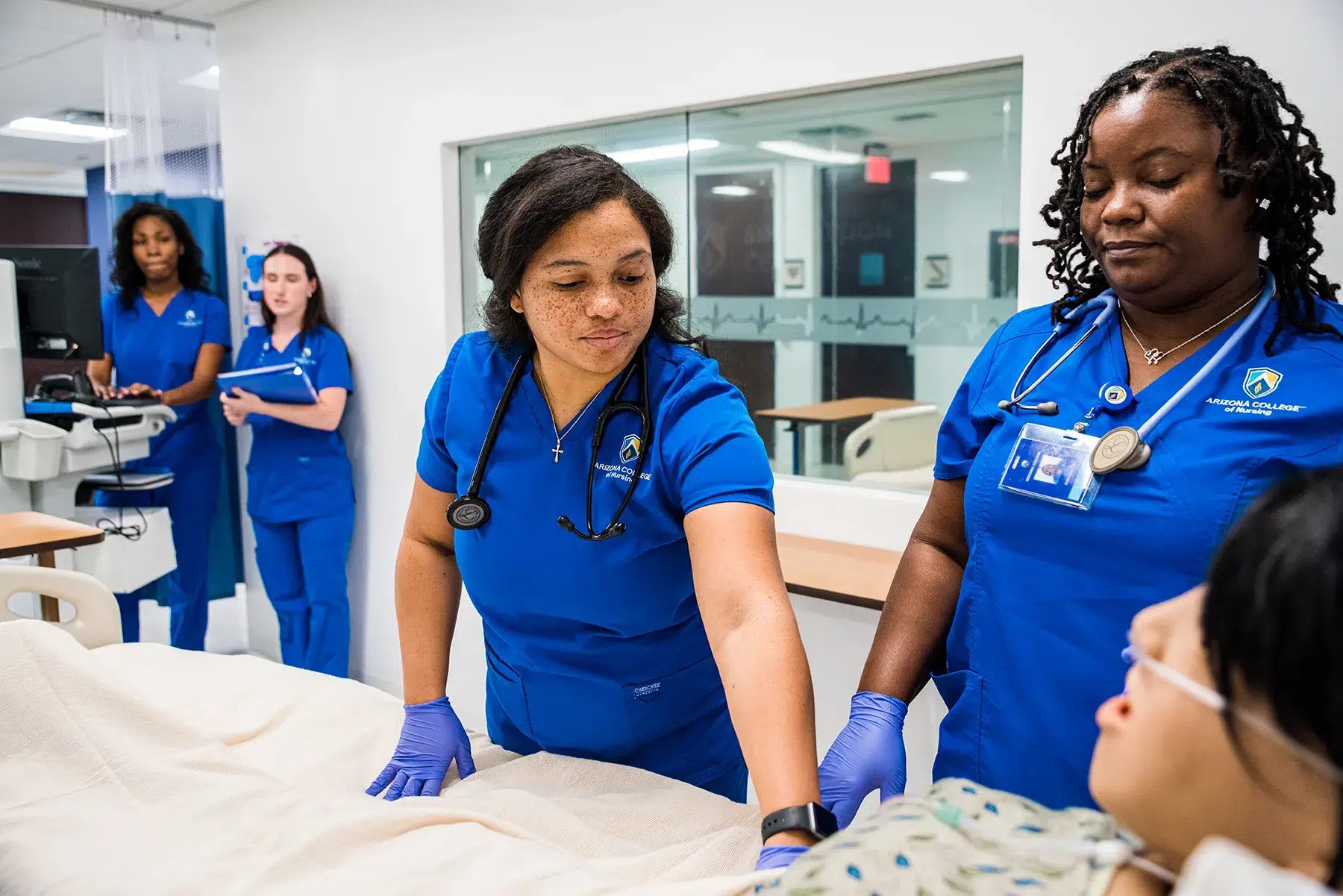
AZCN BSN Program Curriculum
Your nursing career journey toward a Bachelor of Science in Nursing begins with General Education courses that lay the groundwork for your nursing education. If you’re starting the program without transfer credits, these courses are typically completed in eight-week sessions over the first three semesters. On your path to becoming a registered nurse, you’ll study topics like Fundamentals of Biology, Introduction to Psychology, Global Health, and more.
In situations where you are able to transfer in a high number of credits from other schools, you may be able to start nursing core classes during the first year.
Here’s a sample of what your first-year course schedule might look like:
| Semester 1 |
| Course | Credits |
| Fundamentals of Biology | 3 |
| Introduction to Psychology | 3 |
| College Mathematics | 3 |
| First Year Composition I | 3 |
| Total | 12 |
| Semester 2 |
| Course | Credits |
| Human Anatomy/Physiology I | 4 |
| First Year Composition II | 3 |
| American Politics | 3 |
| Human Anatomy/Physiology II | 4 |
| Total | 14 |
| Semester 3 |
| Course | Credits |
| Statistics | 3 |
| Human Development | 3 |
| Introduction to Chemistry | 4 |
| Cultural Diversity & Global Health | 3 |
| Total | 13 |
During your second year in our BSN program, you’ll complete your remaining General Education courses and begin the transition into the core nursing curriculum. This is where you’ll start developing the critical judgment and clinical reasoning skills essential for delivering safe, effective patient care—along with beginning your first hands-on clinical experiences.
Courses in Year 2 may include Ethical & Legal Standards in Nursing, Interprofessional Communication, and Mental Health Theory & Application.
A sample second-year course schedule could look like this:
| Semester 4 |
| Course | Credits |
| Human Pathophysiology | 4 |
| Human Nutrition | 3 |
| Microbiology | 4 |
| Total | 11 |
| Semester 5 |
| Course | Credits |
| Critical Thinking in Clinical Decision-Making | 2 |
| Ethics & Legal Standards in Nursing Practice I | 1 |
| Theoretical Foundation in Nursing Practice + Practicum | 2 didactic 3 practicum |
| Health Assessment | 3 |
| Interprofessional Communications | 1 |
| Leadership for Quality & Patient Safety I | 1 |
| Total | 13 |
| Semester 6 |
| Course | Credits |
| Ethics & Legal Standards in Nursing Practice II | 1 |
| Pharmacology I | 2 |
| Acute & Chronic Health Disruption in Adult 1 + Practicum | 3 didactic 3 practicum |
| Mental Health Theory & Application + Practicum | 3 didactic 2 practicum |
| Evidence-Based Practice I | 1 |
| Total | 15 |
In your final year of our BSN program, you’ll spend the greatest amount of time in direct patient care, applying everything you’ve learned in real healthcare settings. You’ll work alongside experienced medical professionals while continuing to build advanced clinical skills and preparing for your transition into professional nursing practice.
Coursework in Year 3 focuses on specialty areas such as Maternal Health, Pediatric Health, and Community Health.
A typical third-year course schedule could look like this:
| Semester 7 |
| Course | Credits |
| Pharmacology II | 2 |
| Evidence-Based Practice II | 1 |
| Leadership for Quality & Patient Safety II | 1 |
| Acute & Chronic Health Disruption in Adult II + Practicum | 2 didactic 3 practicum |
| Community Health Nursing + Practicum | 3 didactic 3 practicum |
| Total | 15 |
| Semester 8 |
| Course | Credits |
| Maternal Health Theory and Application + Practicum | 3 didactic 2 practicum |
| Pediatric Health Theory and Application + Practicum | 3 didactic 2 practicum |
| Ethics & Legal Standards in Nursing Practice III | 1 |
| Evidence-Based Practice III | 1 |
| Leadership for Quality & Patient Safety III | 1 |
| Total | 13 |
| Semester 9 |
| Course | Credits |
| Transition to the Profession | 1 |
| Acute & Chronic Health Disruption in Adult III + Practicum | 3 didactic 4 practicum |
| Professional Seminar | 2 |
| Evidence-Based Practice IV | 1 |
| Leadership for Quality & Patient Safety IV | 3 |
| Total | 14 |
BSN Program Resource Links
Each of our nursing campuses includes dedicated Nursing Skills Labs designed to reflect real hospital environments, complete with professional-grade equipment and amenities. You will also train in Simulation Labs that feature advanced technology, including high-fidelity patient simulators that support realistic clinical learning experiences.
These hands-on training environments help you build the skills and experience needed for a successful nursing career.
To learn more, visit: https://www.arizonacollege.edu/accredited-bsn-program/skills-and-science-lab/
To help you navigate the language of nursing and healthcare, we offer a BSN Glossary of Terms that defines commonly used terms throughout our program.
Explore the glossary here: https://www.arizonacollege.edu/accredited-bsn-program/nursing-school-glossary-terms/
